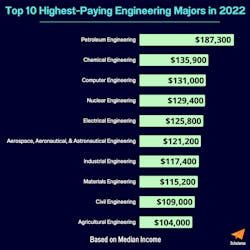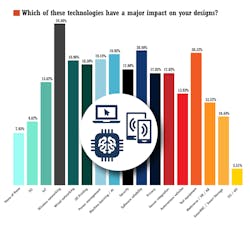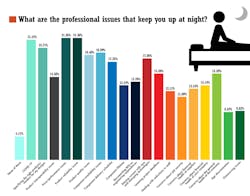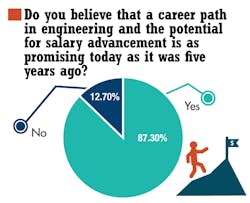Engineering is vital to the continued progress of technology in all areas of life and industries. Year after year it is noted as a promising and well paying career path.
In honor of National STEM/STEAM Day on November 8, the scholarship website Scholaroo released its rankings for the top 13 engineering majors as part of its yearly study of college majors. Of those 13, it ranked the top 10 best-paying engineering majors:
- Petroleum Engineering
- Chemical Engineering
- Computer Engineering
- Nuclear Engineering
- Electrical Engineering
- Aerospace, Aeronautical, & Astronautical Engineering
- Industrial Engineering
- Materials Engineering
- Civil Engineering
- Agricultural Engineering
Computer Engineering and Petroleum Engineering took rankings 2 and 3, respectively, in Scholaroo's overall college major rankings, with several other engineering disciplines making it into the top 55 as well, further signifying the value of this career path. Not only do the results show which engineering fields offer the highest potential for college graduates but also those in which talent is needed due to ongoing societal requirements and technological advancements.
Scholaroo ranked majors based on job availability and salary, job stability, and career cost while also taking into consideration factors such as starting median salary and unemployment rate.
Engineering in the Fluid Power Industry
These results coincide well with Power & Motion's annual Salary & Career Survey which were also recently published. Along with other publications in the Design & Engineering Group of Endeavor Business Media, we polled our engineering audience on a variety of aspects impacting their career such as earnings potential, ongoing effects of COVID-19, career outlook, industry challenges and more.
The general consensus from our audience is that there is, and will remain, a positive outlook for engineering as a career but the industry is currently experiencing a shortage. Like so many other industries, engineering is facing a high level of talent leaving the industry and fewer entering it.
READ MORE: How do We Shape the Future Workforce?
This is particularly felt in the fluid power industry; as we've heard many times over, fluid power is not usually the first industry people think to go into. As such, it's vital the industry works to attract new talent — which many associations and companies are doing.
During an interview with Danfoss Power Solutions President Eric Alström, he said one of the method's the company is using is demonstrating all of the cool things it is working on such as automation, software and electrification. The hope is to show engineering students the industry is keeping up with current technological trends and more advanced than some might think.
As our Salary & Career Survey showed, there are several advanced technologies impacting designs for our readers from 5G and the Internet of Things (IoT) to 3D printing and artificial intelligence (AI). Results were fairly widespread regarding those having the largest impact, but wireless networking followed closely by software reliability took the top spots. Both of these are vital for the ongoing advancement of machines into which fluid power components are integrated such as automation and predictive maintenance.More Collaboration and Knowledge
One of the results from our survey which stuck out to me was the fact most respondents, 79.81%, are being given more tasks outside of their main expertise. Given so many responded they believe there is an engineering shortage, this is not totally surprising but does make one wonder if that is the only reason or what other factors may be playing into this.
Part of this could come from the fact there are so many new technologies entering the market, such as those for electrification and automation, requiring engineers to have a larger knowledge base than they may have received training on. One of the challenges many respondents noted in our survey was the fact that it is becoming difficult to keep up with the diversity of subsystems now available as well as general technology advancements.
In conjunction with this, many noted the difficulty in finding the appropriate learning resources to stay up to date on technology. The almost universal challenge mentioned was how limited engineers' time is to stay on top of technology advances while also trying to maintain a work-life balance. Though not a unique challenge to the industry, ensuring engineers have the time and access to information on new technologies is beneficial to helping them do their jobs well and develop more advanced solutions.
Another interesting point which came from the survey is that over half of respondents, 57.69%, said they are collaborating more with others than before, and the majority, 87.04%, said they are working on projects involving collaboration with other companies. Collaboration is a valuable asset to aid with the engineering shortage and need to share industry knowledge.
In recent years as electrification and other technology trends have picked up pace, we've definitely seen an increase in collaboration announcements between companies. Many companies state when they are doing partnership projects the benefits it can bring to help increase time to market for products as companies do not necessarily need to invest as much time and cost by starting from scratch – instead they can collaborate with another company which already has the expertise to develop appropriate solutions.
Engineering teams can then also gain knowledge and possibly not be stretched as thin as might otherwise be the case if needing to develop a solution from the ground up.
Overall, respondents to our Salary & Career Survey appear optimistic about the engineering field and its future potential despite the current challenges. Many noted the wide range of applications and opportunities available and we continue to hear from the fluid power industry how it’s an exciting time with the advancements taking place in connectivity, electrification and automation which are helping to make it not only a fun industry to be in but also possibly providing an opportunity to help attract more people into it.
We want to hear from you!
How are you feeling about the current state of the fluid power engineering industry? What challenges are you seeing? What are some ways we could be attracting more skilled talent?
Let us know! Email me at [email protected] or reach out to us on social media.
Twitter: @TechnlgyEditor or @PowerMotionTech
LinkedIn: @PowerMotionTech






